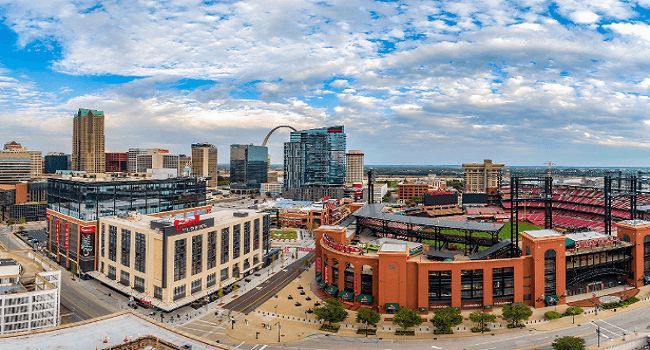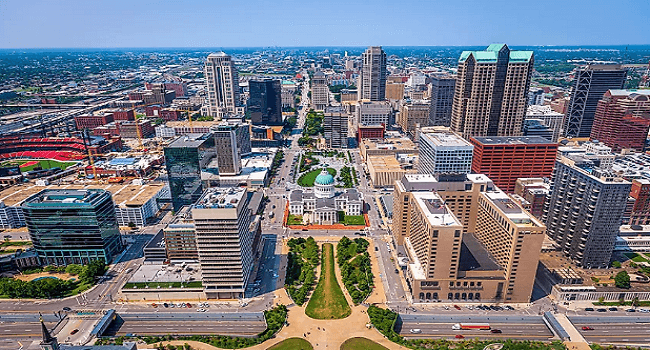Is St. Louis Missouri A Good Place to Live – Welcome to our comprehensive guide on St. Louis, Missouri—a city known for its rich history, vibrant culture, and exceptional quality of life. If you’re contemplating relocation or simply curious about this Midwestern gem, you’ve come to the right place.

In this article, we will delve into the question: “Is St. Louis, Missouri a good place to live?”
We will explore various factors that make a city desirable, such as employment opportunities, cost of living, education, healthcare, recreational amenities, and more.
By the end of this guide, we aim to provide you with a well-rounded perspective on whether St. Louis might be the ideal place for you to call home.
So, let’s embark on this virtual journey to discover the merits and advantages of living in St. Louis, Missouri.
Pros and Cons of Living in St. Louis, Missouri

Whether you’re considering a relocation or simply curious about the city’s advantages and drawbacks, this guide is designed to provide you with valuable insights.
St. Louis, with its rich history, cultural diversity, and thriving economy, offers a multitude of opportunities and experiences for its residents.
However, like any city, it also has its unique challenges and considerations.
By examining both the positive and negative aspects, we aim to equip you with a balanced understanding of what it’s like to live in St. Louis, Missouri.
Pros of Living in St. Louis, Missouri

St. Louis, Missouri, offers a multitude of advantages for those considering it as their place of residence. Here are some of the key pros:
1. Modest Cost of Living
St. Louis boasts a relatively affordable cost of living compared to many other major cities in the United States. Housing, transportation, and daily expenses are generally more budget-friendly, allowing residents to stretch their dollars further.
2. Diverse Economy
The city’s economy is diverse, with a range of industries including healthcare, education, finance, manufacturing, and technology. This diversity provides ample employment opportunities and helps create a stable job market.
3. Excellent Higher Education Options
St. Louis is renowned for its esteemed universities and colleges. Institutions such as Washington University in St. Louis, Saint Louis University, and the University of Missouri-St. Louis offers top-tier educational programs and research opportunities.
4. Plenty of Fun Things to Do
The city is brimming with recreational activities and attractions for residents to enjoy. From visiting the iconic Gateway Arch and exploring Forest Park—home to the Saint Louis Art Museum and the St. Louis Zoo—to attending live performances at the historic Fox Theatre, there is never a shortage of entertainment options.
5. Lots of Housing Options
St. Louis offers a diverse range of housing options to cater to various preferences and budgets. Whether you’re looking for a charming historic home in neighborhoods like Soulard or Lafayette Square, or a modern apartment in the bustling downtown area, there’s something for everyone.
6. Tasty Regional Foods to Try
St. Louis has its own culinary delights to offer, including the famous St. Louis-style pizza, toasted ravioli, and gooey butter cake. Exploring the city’s diverse food scene is a treat for food enthusiasts.
7. The Rich Culture
With its vibrant arts scene, St. Louis embraces its cultural heritage. From museums and galleries to theaters and music venues, the city nurtures a thriving cultural atmosphere, providing residents with countless opportunities to appreciate and engage with various art forms.
Read Also: Is Missouri A Good Place to Live?
8. The Strong Job Market
St. Louis boasts a robust job market, with opportunities across various sectors. Major companies such as Express Scripts, Emerson Electric, and Edward Jones have a significant presence in the city, offering employment prospects in diverse fields.
9. Great Location for Getting Away
Situated in the heart of the Midwest, St. Louis is well-positioned for quick getaways. Residents have easy access to scenic destinations like the Ozark Mountains, the Great River Road, and charming small towns that make for perfect weekend trips.
10. Four-Season Weather
St. Louis experiences distinct seasons, allowing residents to enjoy the beauty and diversity of all four seasons. From the colorful foliage of autumn to mild springs and snowy winters, the city offers a variety of weather experiences.
11. St. Louis is Home to the St. Louis Cardinals
Baseball fans will appreciate the pride and passion that St. Louis residents have for their beloved Major League Baseball team, the St. Louis Cardinals. The team’s games at Busch Stadium create a lively and electric atmosphere that residents can enjoy.
Cons of Living in St. Louis, Missouri

While St. Louis has its fair share of advantages, it’s important to consider some of the challenges and drawbacks that come with living in the city:
1. High Crime Rates and Homelessness
St. Louis faces challenges related to crime rates, particularly in certain neighborhoods. It’s essential to research and understand the specific areas and take necessary precautions. Additionally, homelessness is a prevalent issue that the city continues to address.
2. The Subpar Public School System
St. Louis’s public school system faces significant challenges in terms of educational quality and performance. It’s important for families with school-aged children to carefully research and consider alternative education options such as private schools or charter schools.
3. Lower Household Incomes
St. Louis has lower average household incomes compared to the national average. This can impact the overall standard of living and affordability for residents.
4. Rough Summer Weather
Summers in St. Louis can be hot and humid, with occasional severe weather patterns, including thunderstorms. It’s important to be prepared for these weather conditions and take necessary precautions.
5. Noticeable Discrimination and Segregation
Like many cities in the United States, St. Louis has experienced a history of racial and socioeconomic segregation, leading to disparities in various aspects of life, including housing, education, and employment opportunities. It’s essential to be aware of these issues and work towards fostering a more inclusive and equitable community.
6. Poor Governance
St. Louis has faced challenges related to governance and political leadership, which have at times affected the efficiency and effectiveness of public services and decision-making processes.
7. Limited Public Transportation
St. Louis has a relatively limited public transportation system, primarily consisting of buses. While efforts have been made to improve connectivity, the availability and convenience of public transportation may not meet the expectations of some residents.
It’s crucial to carefully consider these factors and weigh them against the positive aspects when deciding whether St. Louis, Missouri is the right place for you to live.
The Safest Neighborhoods in St. Louis, Missouri

When it comes to safety, St. Louis, Missouri, like any city, has neighborhoods that stand out for their relatively lower crime rates and focus on community well-being. Here are some of the safest neighborhoods in St. Louis:
1. Ballwin
Located in St. Louis County, Ballwin consistently ranks as one of the safest neighborhoods in the area. With its well-maintained residential areas, excellent schools, and low crime rates, Ballwin provides a safe and family-friendly environment.
2. Hi-Pointe
Situated in the southwest part of St. Louis, Hi-Pointe is known for its peaceful atmosphere and a strong sense of community. The neighborhood boasts beautiful tree-lined streets, well-kept homes, and a relatively low crime rate, making it an attractive choice for residents seeking safety and tranquility.
3. Princeton Heights
Located in south St. Louis, Princeton Heights is a neighborhood known for its safety and close-knit community. The area features well-maintained homes, parks, and good schools, making it a desirable option for families.
4. Clifton Heights
Situated southwest of Forest Park, Clifton Heights is a neighborhood characterized by its historic architecture and residential charm. With low crime rates and active community engagement, Clifton Heights offers a safe and welcoming environment for residents.
5. Saint Louis Hills
Located in the southwest part of the city, Saint Louis Hills is known for its beautiful homes, tree-lined streets, and strong community spirit. The neighborhood boasts a relatively low crime rate and offers a tranquil setting for residents.
While these neighborhoods are considered among the safest in St. Louis, it’s essential to note that safety can vary within different parts of a neighborhood.
What is the Best Neighborhood in St. Louis
Determining the “best” neighborhood in St. Louis is subjective and can vary depending on individual preferences and priorities. However, the following neighborhoods are often regarded as highly desirable for their unique characteristics and amenities:
1. Central West End
Located just west of Forest Park, the Central West End neighborhood is known for its vibrant atmosphere, beautiful architecture, and thriving cultural scene. It features trendy restaurants, boutique shops, art galleries, and proximity to Forest Park, making it a popular choice for young professionals and urban dwellers.
2. Downtown
St. Louis’s downtown area offers a dynamic mix of commercial and residential spaces. It has experienced significant revitalization in recent years, with new residential developments, entertainment venues, and dining options. The neighborhood is particularly appealing to those seeking a lively urban lifestyle and easy access to the city’s amenities.
3. Lafayette Square
Situated just south of downtown, Lafayette Square is one of the city’s oldest neighborhoods, known for its historic charm and picturesque Victorian-era homes. The neighborhood features beautifully landscaped streets, a vibrant park, and a variety of local shops and restaurants.
It appeals to those seeking a close-knit community with a mix of historic ambiance and modern conveniences.
4. Shaw
Shaw is a residential neighborhood located in south St. Louis, known for its architectural diversity and the renowned Missouri Botanical Garden. The neighborhood offers a tranquil atmosphere, tree-lined streets, and a strong sense of community.
It’s an ideal choice for those looking for a suburban feel while still being close to the city’s amenities.
5. Soulard
Located just south of downtown, Soulard is one of St. Louis’s oldest and most historic neighborhoods. It is famous for its vibrant nightlife, annual Mardi Gras festivities, and charming brick townhomes. Soulard’s lively atmosphere, bustling farmers’ market, and proximity to downtown make it a popular choice for those seeking an energetic and eclectic neighborhood.
Each of these neighborhoods has its own unique character and appeals to different lifestyles and preferences.
It’s advisable to explore these areas personally and consider factors such as amenities, proximity to work or schools, and overall ambiance to determine the best fit for your individual needs.
Is it Safe to Live in St. Louis, Missouri?
St. Louis, Missouri, unfortunately, has a high rate of violent crime. In 2021, there were 4,387 incidents of violent crime reported in the city. Assault is the most common form of violent crime, accounting for approximately 74% of all reported incidents, followed by robbery.
It is important for residents to be aware of these statistics and take appropriate safety precautions to ensure their well-being.
Is it expensive to live in St. Louis?
The cost of living in St. Louis, Missouri, can vary depending on individual circumstances and preferences. On average, the cost of living in St. Louis is $1,670, which places it in the top 26% of the most expensive cities in the world. In a global list, St. Louis ranks 2,375th out of 9,294 cities. On a national level, it ranks 1,992nd out of 2,202 cities in the United States.
Within Missouri, it ranks 32nd out of 36 cities.
It’s important to consider factors such as housing, transportation, healthcare, and everyday expenses when assessing the overall cost of living in St. Louis.
What is the most dangerous city in St. Louis?
The Central West End is considered one of the most dangerous neighborhoods in St. Louis. With a population of 15,762, it experiences a high rate of violent crimes. As of 2022, the Central West End was ranked as being 208% more dangerous than the national average, with a crime rate of 7,217.
It is crucial for individuals residing or visiting this neighborhood to exercise caution and be aware of their surroundings.
It’s important to note that crime rates can change over time, and it’s advisable to stay updated on current statistics and consult local law enforcement agencies for information on safety and crime in specific areas of St. Louis.
Final Thoughts: Is St. Louis Missouri A Good Place to Live?
In evaluating whether St. Louis, Missouri, is a good place to live, it’s essential to consider the various factors discussed throughout this article.
St. Louis offers several advantages, such as a modest cost of living, a diverse economy, excellent higher education options, plenty of recreational activities, housing options, regional cuisine, rich culture, a strong job market, and a great location for getaways.
The city also experiences distinct four-season weather and is home to the beloved St. Louis Cardinals.
However, there are also certain drawbacks to consider.
St. Louis faces challenges related to high crime rates and homelessness, a subpar public school system, lower household incomes, rough summer weather, noticeable discrimination and segregation, poor governance, and limited public transportation.
Ultimately, whether St. Louis is a good place to live depends on your preferences, priorities, and circumstances. By weighing the pros and cons and considering personal preferences, one can determine if St. Louis, Missouri, aligns with their lifestyle, aspirations, and overall well-being.